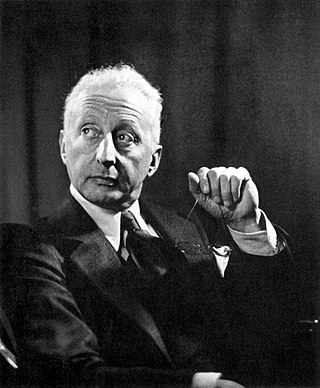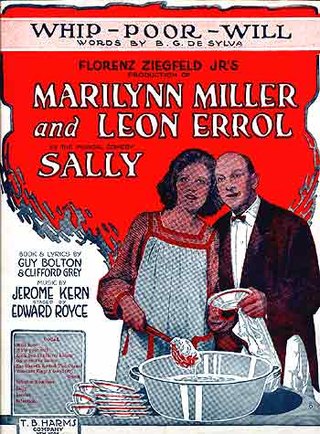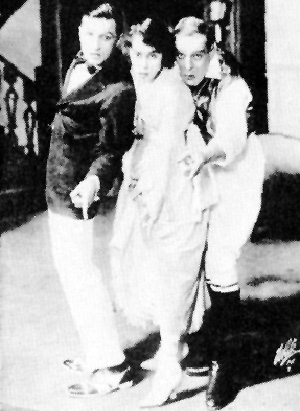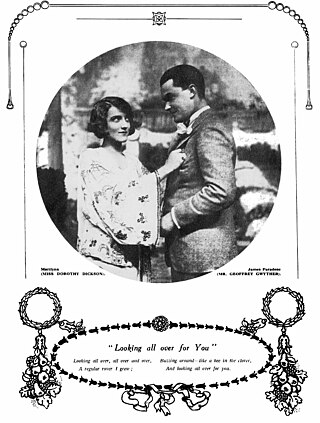
Jerome David Kern was an American composer of musical theatre and popular music. One of the most important American theatre composers of the early 20th century, he wrote more than 700 songs, used in over 100 stage works, including such classics as "Ol' Man River", "Can't Help Lovin' Dat Man", "A Fine Romance", "Smoke Gets in Your Eyes", "The Song Is You", "All the Things You Are", "The Way You Look Tonight" and "Long Ago ". He collaborated with many of the leading librettists and lyricists of his era, including George Grossmith Jr., Guy Bolton, P. G. Wodehouse, Otto Harbach, Oscar Hammerstein II, Dorothy Fields, Johnny Mercer, Ira Gershwin and Yip Harburg.
This is a list of notable events in music that took place in the year 1923.

George Grossmith was an English comedian, writer, composer, actor, and singer. His performing career spanned more than four decades. As a writer and composer, he created 18 comic operas, nearly 100 musical sketches, some 600 songs and piano pieces, three books and both serious and comic pieces for newspapers and magazines.

Guy Reginald Bolton was an Anglo-American playwright and writer of musical comedies. Born in England and educated in France and the US, he trained as an architect but turned to writing. Bolton preferred working in collaboration with others, principally the English writers P. G. Wodehouse and Fred Thompson, with whom he wrote 21 and 14 shows respectively, and the American playwright George Middleton, with whom he wrote ten shows. Among his other collaborators in Britain were George Grossmith Jr., Ian Hay and Weston and Lee. In the US, he worked with George and Ira Gershwin, Kalmar and Ruby and Oscar Hammerstein II.

Sally is a musical comedy with music by Jerome Kern, lyrics by Clifford Grey and book by Guy Bolton, with additional lyrics by Buddy De Sylva, Anne Caldwell and P. G. Wodehouse. The plot hinges on a mistaken identity: Sally, a waif, is a dishwasher at the Alley Inn in New York City. She poses as a famous foreign ballerina and rises to fame through joining the Ziegfeld Follies. There is a rags to riches story, a ballet as a centrepiece, and a wedding as a finale. "Look for the Silver Lining" continues to be one of Kern's most familiar songs. The song is lampooned by another song, "Look for a Sky of Blue," in Rick Besoyan's satirical 1959 musical Little Mary Sunshine.

The Gillian Lynne Theatre is a West End theatre located on the corner of Drury Lane and Parker Street in Covent Garden in the London Borough of Camden. The Winter Garden Theatre formerly occupied the site until 1965. On 1 May 2018, the theatre was officially renamed the Gillian Lynne Theatre in honour of Gillian Lynne. It is the first theatre in the West End of London to be named after a non-royal woman.

Oh, Boy! is a musical in two acts, with music by Jerome Kern and book and lyrics by Guy Bolton and P. G. Wodehouse. The story concerns befuddled George, who elopes with Lou Ellen, the daughter of Judge Carter. He must win over her parents and his Quaker aunt. His dapper polo champion friend Jim is in love with madcap actress Jackie, but George must hide her while she extricates herself from a scrape with a bumbling constable whom she punched at a party raid.

George Grossmith Jr. was an English actor, theatre producer and manager, director, playwright and songwriter, best remembered for his work in and with Edwardian musical comedies. Grossmith was also an important innovator in bringing "cabaret" and "revues" to the London stage. Born in London, he took his first role on the musical stage at the age of 18 in Haste to the Wedding (1892), a West End collaboration between his famous songwriter and actor father and W. S. Gilbert.

The Beauty of Bath is a musical comedy with a book by Seymour Hicks and Cosmo Hamilton, lyrics by C. H. Taylor and music by Herbert Haines; additional songs were provided by Jerome Kern, F. Clifford Harris (lyrics) and P. G. Wodehouse (lyrics). Based loosely on the play David Garrick, the story concerns a young woman from a noble family, who falls in love with an actor. She then meets a sailor who appears identical to the actor and mistakes him for the latter. Her father objects to a marriage with the actor, but when it turns out that she really loves the sailor, all objections fall away.
Primrose is a musical in three acts with a book by Guy Bolton and George Grossmith Jr., lyrics by Desmond Carter and Ira Gershwin, and music by George Gershwin. It centres on a writer whose story-within-a-story forms the basis of the plot. It was written expressly for the London stage, where it ran for 255 performances in 1924 and 1925. The musical played in Australia, but it was not performed in the United States until more than half a century after it was written.

The Cabaret Girl is a musical comedy in three acts with music by Jerome Kern and book and lyrics by George Grossmith, Jr. and P. G. Wodehouse. It was produced by Grossmith and J. A. E. Malone at the Winter Garden Theatre in London's West End in September 1922 and featured Dorothy Dickson, Grossmith, Geoffrey Gwyther, and Norman Griffin in the leading roles.

Lawrence Randall Grossmith was an English actor, the son of the Gilbert and Sullivan performer George Grossmith and the brother of the actor-manager George Grossmith Jr.

Frederick A. Thompson, usually credited as Fred Thompson was an English writer, best known as a librettist for about fifty British and American musical comedies in the first half of the 20th century. Among the writers with whom he collaborated were George Grossmith Jr., P. G. Wodehouse, Guy Bolton and Ira Gershwin. Composers with whom he worked included Lionel Monckton, Ivor Novello and George Gershwin.

Oh, Lady! Lady!! is a musical with music by Jerome Kern, a book by Guy Bolton and P. G. Wodehouse and lyrics by Wodehouse. It was written for the Princess Theatre on Broadway, where it played in 1918 and ran for 219 performances. The story concerns an engaged young man, Bill, whose ex-fiancée arrives unexpectedly on his wedding day. Bill works to convince his old flame that he was not worthy to marry her, but his clumsy efforts do not make him look good to his new fiancée, whose mother already dislikes Bill. A couple of crooks cause further complications.

Kissing Time, and an earlier version titled The Girl Behind the Gun, are musical comedies with music by Ivan Caryll, book and lyrics by Guy Bolton and P. G. Wodehouse, and additional lyrics by Clifford Grey. The story is based on the 1910 play, Madame et son Filleul by Maurice Hennequin, Pierre Véber and Henry de Gorsse. The story is set in contemporary France, with a glamorous actress at the centre of a farcical plot of imposture, intrigue and mistaken identity.

Leave It to Jane is a musical in two acts, with music by Jerome Kern and book and lyrics by Guy Bolton and P. G. Wodehouse, based on the 1904 play The College Widow, by George Ade. The story concerns the football rivalry between Atwater College and Bingham College, and satirizes college life in a Midwestern U.S. town. A star halfback, Billy, forsakes his father's alma mater, Bingham, to play at Atwater, to be near the seductive Jane, the daughter of Atwater's president.
Miss 1917 is a musical revue with a book by Guy Bolton and P. G. Wodehouse, music by Victor Herbert, Jerome Kern and others, and lyrics by Harry B. Smith, Otto Harbach, Henry Blossom and others. Made up of a string of vignettes, the show features songs from such musicals as The Wizard of Oz, Three Twins, Babes in Toyland, Ziegfeld Follies and The Belle of New York.
Beauty Prize may refer to:

Coralie Blythe, was an English actress and singer, who is best remembered for her numerous postcard photos and her roles in Edwardian musical comedy. Although she never became a big star, she worked steadily in London's West End and in British provincial theatres from her teen years until after World War I, especially for producer George Edwardes, and had a few roles in America. She sometimes performed with her husband, Lawrence Grossmith, and her brother, Vernon Castle.
This is a summary of 1921 in music in the United Kingdom.















